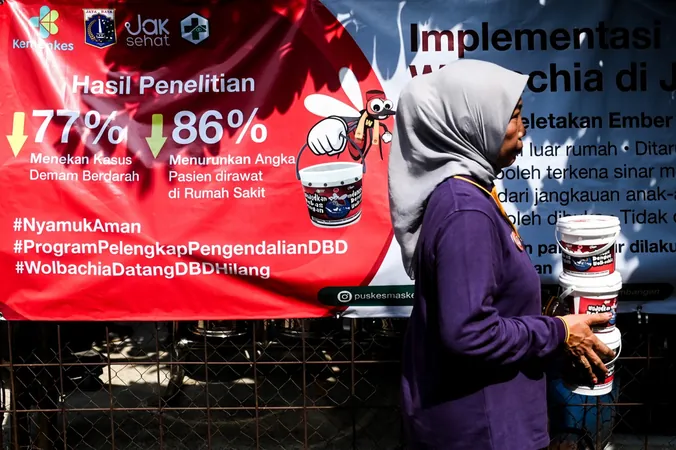
Groundbreaking Initiative: Jakarta Unleashes Wolbachia-Infested Mosquitoes to Combat Dengue Fever!
2024-10-06
Groundbreaking Initiative: Jakarta Unleashes Wolbachia-Infested Mosquitoes to Combat Dengue Fever!
In an innovative move to combat the rising threat of dengue fever, Jakarta's administration has officially launched a groundbreaking program that involves releasing thousands of mosquito larvae infected with the Wolbachia bacteria in the Kembangan district. This initiative targets nearly 1,200 households that will be equipped with buckets filled with mosquito eggs and larvae, ensuring these pests hatch into adult mosquitoes that will help combat the disease.
Wolbachia is a naturally occurring bacterium that is found in about 60% of insect species but is notably absent in the notorious Aedes aegypti, the primary vector responsible for transmitting dengue fever to humans. When these mosquitoes become infected with Wolbachia, the bacteria weakens the dengue virus, thus significantly diminishing the mosquitoes' capacity to spread the disease. This revolutionary method not only targets the mosquito population but also directly impacts public health.
In an interesting biological twist, when a male mosquito infected with Wolbachia mates with a non-infected female, the eggs produced are unfortunately unable to hatch. However, if the female mosquito is also infected, their offspring will carry the Wolbachia, resulting in adult mosquitoes that are considerably less likely to carry and transmit the dengue virus.
The decision to implement this life-saving project in Kembangan comes amid alarming dengue statistics, with an incidence rate of 54.1 cases per 100,000 residents recorded in 2023 by the Jakarta Health Agency. West Jakarta has been hit especially hard, logging the highest count of dengue patients, peaking at 799 cases in April before the numbers dropped significantly by September.
Mayor Uus Kuswanto underscored the strategic selection of Kembangan for this initiative, citing its dense population and community solidarity. "The Kembangan district has a high population density, and residents have demonstrated a willingness to collaborate, making it an ideal location for the release of Wolbachia-infected Aedes aegypti mosquitoes," he stated proudly.
As this ambitious plan unfolds, it opens a new chapter in disease control that many hope will be replicated in other dengue-prone areas around the globe. Could this be the game-changer we've all been waiting for in the fight against dengue fever? Only time will tell as Jakarta leads the way into uncharted territory in public health innovation!




 Brasil (PT)
Brasil (PT)
 Canada (EN)
Canada (EN)
 Chile (ES)
Chile (ES)
 España (ES)
España (ES)
 France (FR)
France (FR)
 Hong Kong (EN)
Hong Kong (EN)
 Italia (IT)
Italia (IT)
 日本 (JA)
日本 (JA)
 Magyarország (HU)
Magyarország (HU)
 Norge (NO)
Norge (NO)
 Polska (PL)
Polska (PL)
 Schweiz (DE)
Schweiz (DE)
 Singapore (EN)
Singapore (EN)
 Sverige (SV)
Sverige (SV)
 Suomi (FI)
Suomi (FI)
 Türkiye (TR)
Türkiye (TR)